Robert Wilhelm Ekman
Robert Wilhelm Ekman (August 13, 1808 – February 19, 1873), a.k.a. R. W. Ekman, was a significant teacher and painter of the Finnish romantic portraits and early national romanticism.[1][2]
Robert Wilhelm Ekman | |
|---|---|
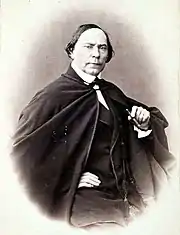 | |
| Born | 13 August 1808 |
| Died | 19 February 1873 (aged 64) |
| Nationality | Finnish |
| Known for | Painting |
Childhood and Arts Education
Robert Ekman was born in Uusikaupunki, Finland to an upper-class family. His father was Carl Christoffer Ekman, a medical doctor and a mayor, and his mother was Sara Elisabet (maiden name Gadolin). Both of his parents died when he was approximately 10 years old. They left behind five orphans who were placed in foster homes. Their schooling was incomplete and there was no chance of higher academic education.[1]
Robert Ekman first studied art under the guidance of Finnish painter Gustaf Wilhelm Finnberg (1784–1833), but in 1824 together with his brother Fredric, Joachim begun studies at the Royal Swedish Academy of Arts in Stockholm and later studied in the studio of Johan Gustaf Sandberg (1782–1854). Already as a student Ekman specialized in portraying the life of the common people, instead of Classicism of the academic arts. Ekman graduated in 1836, and was granted a generous traveling scholarship for excelling in his studies. This supported him working in the Netherlands, France and Italy between years 1837–1844. As the scholarship was not plausible otherwise, Ekman took Swedish citizenship.[3][4][1]
Court Painter and a Teacher
Upon returning to Stockholm, Ekman was dubbed as an agré (member candidate) and was accepted as a member of the academy in 1844. The title included the one of royal court and history painter. In 1845 Ekman returned to Turku, where he began decorating the Turku Cathedral with wall paintings. The laborious fresco were finished in 1854. Additionally, he completed over 30 church altarpieces during his career including works at Helsinki (1846–1848), Sääksmäki (1847), Viitasaari (1849), Sauvon (1853), Oulu (1859), Tammela (1860), Vaasa (1861), Pori (1863), Paimio (1865), Tyrvää (1866) and Perelt (1871).[5]
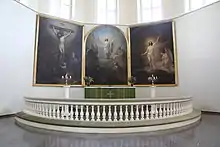
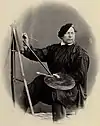
Having lived in Finland for ten years, Ekman regained Finnish citizenship in 1855. Having moved to Turku, Ekman started working on art education with master painter Carl Gustaf Söderstrand (1800–1862). In 1846 the Turku School of Drawing was founded and led by Ekman until his death. He died at Turku during 1873.[6][5]
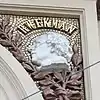
Works
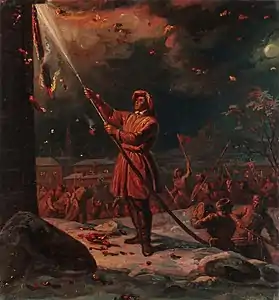
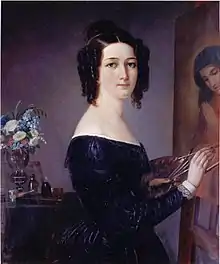 Portrait of Mathilda Rotkirch, 1848
Portrait of Mathilda Rotkirch, 1848 Pentti Lyytinen Recites Poems in a Cottage in Savo
Pentti Lyytinen Recites Poems in a Cottage in Savo Ensign Stål and the Undergraduate, 1853
Ensign Stål and the Undergraduate, 1853
 Portrait of Georg August Wallin, 1853
Portrait of Georg August Wallin, 1853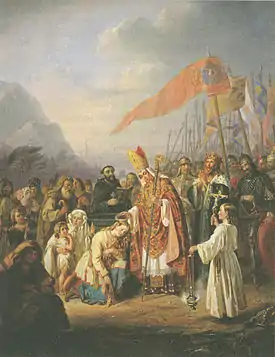 Bishop Henry Baptizing Finns, 1850–54
Bishop Henry Baptizing Finns, 1850–54 Scene from J. L. Runeberg´s "Moose Hunters", 1856
Scene from J. L. Runeberg´s "Moose Hunters", 1856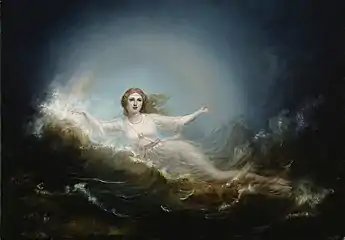 Ilmatar, 1860
Ilmatar, 1860 Fleeing Paganism; Väinämöinen Gives Way to the Power of the Cross, 1860
Fleeing Paganism; Väinämöinen Gives Way to the Power of the Cross, 1860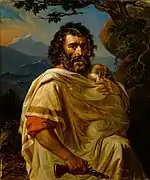 Italian Man with a Child, 1860
Italian Man with a Child, 1860 Jesus Wakes Lazarus, 1860
Jesus Wakes Lazarus, 1860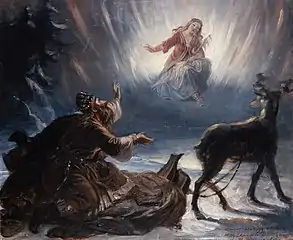 Väinämöinen and Maiden of Pohjola, 1861
Väinämöinen and Maiden of Pohjola, 1861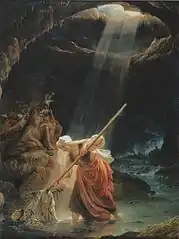 Lemminkäinen's Mother at Tuonela, 1862
Lemminkäinen's Mother at Tuonela, 1862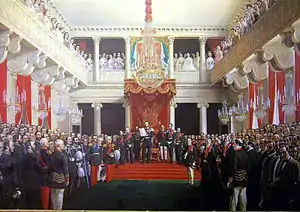 Emperor Alexander II Declares the 1863 Diet Session Open, 1865
Emperor Alexander II Declares the 1863 Diet Session Open, 1865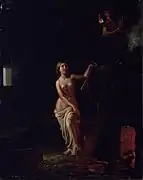 Bridal Sauna
Bridal Sauna Väinämöinen's Play, 1866, a 4-meter tall painting displayed at Old Student House, Helsinki
Väinämöinen's Play, 1866, a 4-meter tall painting displayed at Old Student House, Helsinki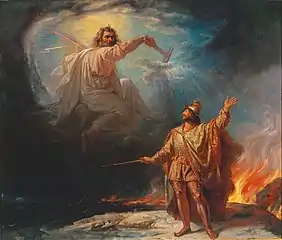 Lemminkäinen at the Fiery Lake, c. 1867, depicting a call for help from Ukko
Lemminkäinen at the Fiery Lake, c. 1867, depicting a call for help from Ukko Kreeta Haapasalo Playing the Kantele in a Peasant Cottage, 1868
Kreeta Haapasalo Playing the Kantele in a Peasant Cottage, 1868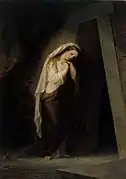 Mary Magdalene by the Grave of Christ, 1869
Mary Magdalene by the Grave of Christ, 1869 Winter Fishing in front of Turku, 1872
Winter Fishing in front of Turku, 1872
See also
References
- "Robert Wilhelm Ekman". Biografiskt lexikon för Finland. Retrieved January 1, 2019.
- Reitala, Aimo (19 April 2016). "Ekman, Robert Wilhelm (1808 - 1873)". Kansallisbiografia. Retrieved 5 August 2020.
- "Gustaf Wilhelm Finnberg". ateneum/guide. Retrieved January 1, 2019.
- Bo Lundström. "Johan Gustaf Sandberg". Svenskt biografiskt lexikon. Retrieved January 1, 2019.
- "Robert Wilhelm Ekman". lahteilla. Retrieved January 1, 2019.
- "Söderstrand, Carl Gustaf (1800 - 1862)". kansallisbiografia. Retrieved January 1, 2019.
Other sources
- Hintze, Bertel (1926) Robert Wilhelm Ekman 1808–1873: En konsthistorisk studie (Helsingfors: Schildt)
![]() Media related to Paintings by Robert Wilhelm Ekman at Wikimedia Commons
Media related to Paintings by Robert Wilhelm Ekman at Wikimedia Commons